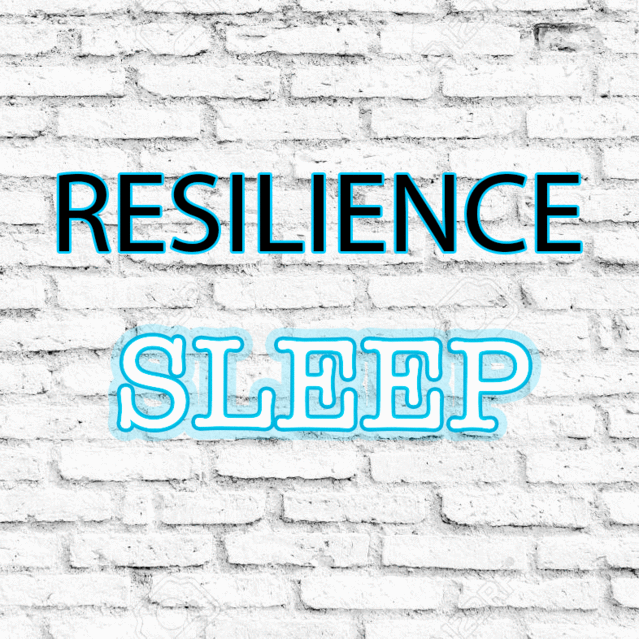Sleep
Sleep: Practical Tips to Increase Resilience
Research shows proper sleep is vital to your mental health and resilience.
Posted April 6, 2020

More than 40 percent of Americans do not get the minimum daily recommended amount of sleep per night. This staggering statistic has been on the rise, according to recent data, and it includes first responders and healthcare workers. Recent survey data of police officers listed sleep concerns as one of their top causes of stress.
When someone doesn’t get the sleep they need, their brain isn’t fully charged to deal with the stressors of daily work and as well as the stressors experienced in their personal lives. Additionally, poor sleep is one of the most common symptoms of depression.
Lack of sleep can create a variety of issues and concerns including:
- Interfering with controlling your emotions
- Worsening your overall mood
- Diminishing pain threshold
- Interfering with memory and learning
- Feeling hopeless, and
- Isolation and feeling lonely
Watch this video for sleep tips
According to both the American Foundation for Suicide Prevention and the American Association of Suicidology, lack of sleep is one of the many warning signs of suicide risk. Suicide is complicated and sleep—either too much or too little—can be cause for alarm along with other risk factors and warning signs.
The physical toll that a lack of sleep can take is worrisome too as not only does it impact the immune system, it is also connected with a heightened risk of:
- High blood pressure
- Heart disease
- Stroke
- Diabetes, and
- Obesity
Not getting enough sleep actually has a name—sleep debt. When this type of debt adds up, it is not a bank that comes knocking at your door to collect. Instead, and in addition to those already mentioned, the negative impact is on decision making, memory, and attention.
Some might think if you’re only getting a few hours of sleep during the week, you will “catch up” on the weekend with 12 hours of sleep each night. That is not advised either. Research has shown this type of “binge sleeping” to be harmful too. It’s been compared to having jetlag like traveling between New York City and Paris time zones.
Much like how there is a negative term for the negative accumulation of a lack of sleep hours, there is also a term for having positive sleeping habits – good sleep hygiene. Sure, it might not be the greatest of terms but we all want good, clean sleep, right? And just as an aside, some people refer it to the slightly better sounding, “sleep health.”
Getting sufficient sleep is closely linked with positive mental health and resilience. Think about it, having a proper night’s sleep allows you to re-energize in order to take on the expected and unexpected stressors the next day will bring. Researcher Matthew Walker explains how vital sleep is:
"Sleep appears to restore our emotional brain circuits… sleep is not a luxury that we can optionally choose to take whenever we like. It is a biological necessity, and without it, there is only so far the band will stretch before it snaps, with both cognitive and emotional consequences.” (From Southwick & Charney, 2018).
Before we begin with the tips, first know it’s normal to wake up briefly during the middle of the night. Stressing over this can only make it harder to fall back asleep.
The right amount of sleep is different for each person but generally for the average adult, it is between seven to nine hours a night. To be clear, only a small amount of people can function with less than the suggested number of hours of sleep. That should serve as a reminder that a diminished amount of sleep is not a badge of honor to wear or boast about.
Instead, it’s a cause for alarm. Fortunately, you can start practicing the actions below tonight to increase your amount and quality of sleep.
Establish a “sleep routine”:
- Lower the lights in your room when preparing for bed.
- Make sure to get fresh air and “bright light” during the day, it helps establish your sleep rhythm.
- Avoid using electronics just before bed, especially while in bed.
- Don’t “clock watch”—turn your clock away so if you do wake up during the night, you don’t stress over seeing how much time you have left to sleep.
- Physical exercise. Yes, exercise but make sure not to do it in the evening too close to your bedtime.
- Avoid alcohol and caffeine close to bedtime.
- Don’t have a big meal before bed (less than three hours).
- Sleep when you are tired.
- Don’t nap for too long or too late.
- Generally, aim for eight hours of sleep (again, between seven and nine hours).
- Make sure your environment is set up to help. Any of the following can help: have dark window shades, an eye mask, use white noise (like a fan), change your pillow or mattress, and make sure the room isn’t too warm.
- Have a gratitude practice just before bed (reflect on positive experiences from the day, read more on this here).
Creating a new and effective sleeping routine is not something that will happen instantly and overnight (pun not intended!). It’s a work in progress so try to avoid letting yourself fall into the trap of frustration if results are not automatic. Trust yourself with the process and choose from the list above that works best for you. Even if you have tried any in the past and they didn’t work, try it again as it might work this time.
Also, sometimes more help is needed in addition to the above suggestions. In these cases, it only makes sense to reach out to a doctor or possibly a therapist who can help you address what might be some of the underlying conditions and issues that are contributing to your trouble with sleeping.
Much like how you would call for assistance from fellow officers while on patrol if you need it, this is no different. You don’t have to accept deficient sleep nor do you have to try to fix it by yourself. Help is available.
Don’t wait. You deserve a good night’s rest and sleep.
Try it
Remember, resilience isn’t made by reading articles, it is developed through practices and that creates habits and routines. Review the above tips and suggestions and try some of them out to see what works best for you.
For the next five days (yes five days, don’t forget you are trying to build a new habit), write down on a notepad:
- One thing that made you happy (yes, write it). An evening gratitude practice has many benefits, among them helping you fall asleep. Dig a bit deeper when you write it and think about a few reasons why it made you happy.
- Write down what time you went to bed. Remember, the goal is generally between seven and nine hours.
- Write down what time you got out of bed when you wake in the morning and then next to that the total amount of hours you slept.
- Drink a glass of water soon after waking. Write down in your notebook that you did it.
References
Alaska Sleep Education Center (2019, January 10). The new trend of binge-sleeping. https://www.alaskasleep.com/blog/the-new-trend-of-binge-sleeping
American Association of Suicidology (n.d.). Warning signs. https://suicidology.org/resources/warning-signs/https://suicidology.org/resources/warning-signs/
American Foundation for Suicide Prevention (n.d.). Risk factors and warning signs. https://afsp.org/about-suicide/risk-factors-and-warning-signs/
American Psychological Association (February, 2014). More sleep would make us happier, healthier and safer. https://www.apa.org/action/resources/research-in-action/sleep-deprivation
Columbia University, Go Ask Alice (n.d.). Healthy sleeping habits. https://goaskalice.columbia.edu/fact-sheet/healthy-sleep-habits
Columbia University Irving Medical Center, Student Health Service (n.d.). Sleep. https://www.cumc.columbia.edu/student-health/center-student-wellness/wellness-resources/sleep
Columbia University Psychiatry [ColumbiaPsych]. (2019, September 4). Dr. Blake Zakarin discusses the relationship between sleep, mental health, and suicide. https://youtu.be/v0a7sKRYiXI
Khubchandani, J., Price, J.H. (2020). Short sleep duration in working American adults, 2010–2018. J Community Health, 45, 219–227. https://doi.org/10.1007/s10900-019-00731-9
Klein, J. (2019, September 29). First responders and sleep. Psychology Today. https://www.psychologytoday.com/us/blog/sleepless-in-america/201909/first-responders-and-sleep
Korb, A. (2015). The upward spiral: Using neuroscience to reverse the course of depression, one small change at a time. Oakland, CA: New Harbinger Publication.
Neighmond, P. (2019, October 28). Working Americans are getting less sleep, especially those who save our lives. NPR.org. https://www.npr.org/sections/health-shots/2019/10/28/773622789/working-americans-are-getting-less-sleep-especially-those-who-save-our-lives
Southwick, S. M., & Charney, D. S. (2012). Resilience: The science of mastering life's greatest challenges. Cambridge University Press. https://doi.org/10.1017/CBO9781139013857




